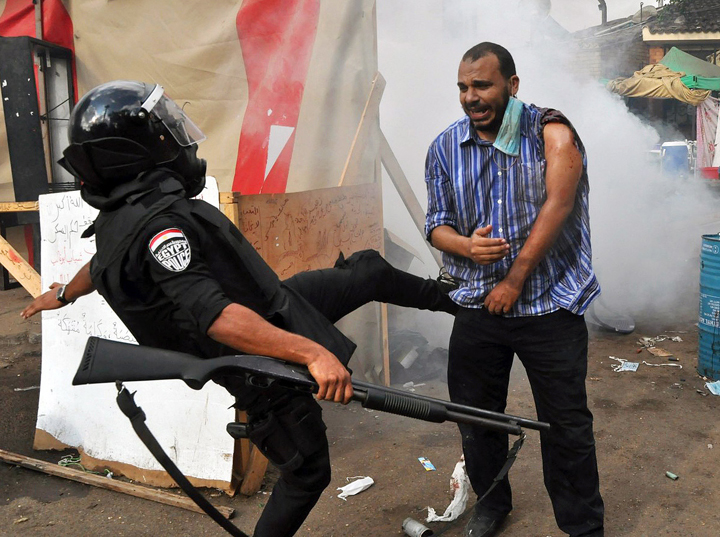CAIRO, Egypt – Human Rights Watch said Tuesday that Egypt’s security forces likely committed crimes against humanity when it crushed Islamist protests last year, comparing the bloodshed to China’s Tiananmen Square massacre and calling for a U.N. investigation into the role of President Abdel-Fattah el-Sissi, and his security chiefs.

In a 188-page report, the rights group accused security forces of deliberately using excessive force against supporters of Mohammed Morsi, the Islamist president ousted by el-Sissi last summer. It called the crushing of the main protester sit-in at Cairo’s Rabaah el-Adawiya Square on Aug. 14, 2013, the “world’s largest killings of demonstrators in a single day in recent history.”
CLICK HERE TO READ THE FULL HUMAN RIGHTS WATCH REPORT
The Egyptian government angrily rejected the report. After barring Human Rights Watch executives from entering the country to issue the report, it accused the group of bias and implied it was serving the agenda of the Muslim Brotherhood group, from which Morsi hails and which the government labelled a terrorist group.
Based on a year-long investigation into the incidents that followed Morsi’s ouster on July 3, 2013, New York-based HRW said it documented at least 817 protesters killed when security forces violently dispersed the Rabaah sit-in. It said the number could be as high as 1,000. The government puts the death toll at 624, while Morsi supporters put it at over 2,500.

Get breaking National news
“Like in Tiananmen … we are likely never to know the actual number of people killed in Rabaah,” said Omar Shakir, one of the principle researchers of the report, titled “All According to Plan.”
Estimates for the toll from China’s 1989 crackdown on protesters in Beijing’s Tiananmen Square have ranged from the hundreds to the thousands. China allows no public discussion of the events.
In a strongly-worded statement, the Egyptian government said the Rights Watch report’s authors operated in Egypt without a permit, calling it a “blatant violation” of the country’s sovereignty.
“While it is not surprised by the report, in light of the organizations’ clear leaning and methods, the government rejects the report and criticizes its bias,” the statement said. Apparently seeking to paint the rights group as linked to the Brotherhood, it said HRW launched its report “in conjunction with suspicious movements by the terrorist group and its supporters, which … are inciting violence.”
The report was launched two days before the one year anniversary of the dispersal, when Morsi supporters plan to protest in commemoration.
The government insisted it observed international standards in dealing with protests, and security officials have said police opened fire in response to gunfire by protesters. Eight policemen were killed during the dispersal. But by the government’s own account, only 15 guns were found at the sit-in, nothing that merits such indiscriminate shooting by authorities, the group said.
The report’s authors said they had been in touch with government officials throughout their investigation, asking them repeated questions about their policies and planning, but received no response. For the report, Human Rights Watch said it interviewed at least 200 witnesses and reviewed of footage and government statements.
In the days following Morsi’s ouster, security and military repeatedly opened fire on protests, killing at least 281 in four different incidents investigated by HRW in July and August before the dispersal of Rabaah and a second sit-in.
“The violations likely amount to crimes against humanity,” it said of the crackdown on protesters.
Human Rights Watch called for an international inquiry into el-Sissi and 10 security chiefs over the deaths. Since removing Morsi – in the wake of massive protests against the Islamist leader – el-Sissi has been Egypt’s most powerful man. He was elected president in a landslide vote earlier this year.
The group also called on Egypt’s allies to suspend military aid and co-operation with Egypt’s authorities and military until the government adopts measures to end human rights violations.
“It is very short-sighted on the part of the major Western governments to believe if they just make nice with el-Sissi’s government that somehow this imagined transition to democracy which is repeatedly trumpeted will somehow come to pass,” HRW Executive Director Kenneth Roth, speaking from New York, said in a videoconference with journalists.
“The message sent so far is that Egypt can get away with mass murder,” he said. “That is a disastrous message to try to build a genuine democracy.”
Associated Press writer Maggie Michael contributed to this report from Cairo.







Comments